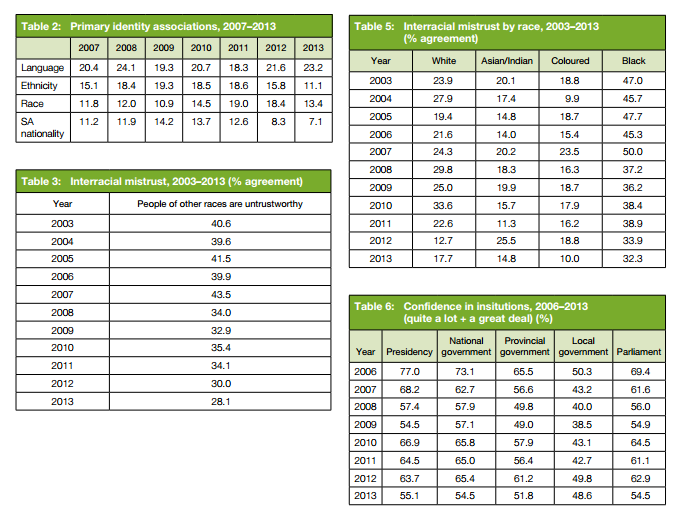IJR RELEASES 2014 SA RECONCILIATION BAROMETER SURVEY REPORT
Reflecting on Reconciliation: Lessons from the Past, Prospects for the Future
It has been a historic year for South Africa. The 20th year of our democracy has also been the first without our international icon of reconciliation, Nelson Mandela. In this context, the Institute for Justice and Reconciliation (IJR) has devoted the 2014 edition of its annual South African Reconciliation Barometer (SARB) report to reflecting on past progress, present relevance and future challenges for reconciliation in South Africa (see here - PDF). The report, authored by Dr Kim Wale, reflects on over a decade's worth of SARB data.
Key trends from more than a decade of SARB data demonstrate that:
South Africans have grown disillusioned with the idea of a united South African identity and are calling for a more complex understanding of what it means to share a South African identity.
Over the past decade, South Africans' agreement that a united national identity is desirable has steadily decreased by 17.9%, from 72.9% in 2003 to 55% in 2013. Interpreting these results, Wale demonstrates that they speak to the need to develop a more nuanced understanding of South African identity which allows for diversity within unity.
Trust between people from different race groups has consistently improved over the past decade.
Reported mistrust of other race groups has steadily decreased by 12.5%, from 40.6% in 2003 to 28.1% in 2013 (see table below for racial breakdown).
Increasing racial integration excludes the poor
While levels of interracial socialisation have improved over the past 11 years, the poor remain largely excluded from this social integration. The percentage of South Africans who report often or always talking to someone from another race increased from 10.4% in 2003 to 23.5% in 2013. However, when this figure is disaggregated by class, South Africans in the higher living standards measure (LSM) groups are much more likely to socialise across race groups than the middle LSMs, while the lowest LSMs are the least likely to socialise across race.
Trust in leaders has decreased for black South Africans over time
Black South Africans demonstrate the highest levels of trust in leaders and parliament. However these figures are decreasing over time. In 2003 70.4% of Black South Africans agreed that they trust Parliament. However, in 2013 this figure had dropped to 52.9%. Similarly, between 2003 and 2013, trust in national leaders for this group declined from 62.5% to 53.8%.
South Africans less likely to acknowledge the oppression of apartheid
South Africans are 10.1% less likely to agree that apartheid was a crime against humanity in 2013 than they were in 2003.
White South Africans have an important role to play in furthering reconciliation
White South Africans demonstrate lower levels of trust in the political system, lower levels of support for racial integration, higher levels of denial about the injustices of apartheid, and lower levels of support for redress related to such injustices.
On the positive side, over the past 11 years white South Africans have significantly improved in their support for the political system, as well as for racial integration (and especially interracial marriage). Wale proposes that these and related findings speak to the importance of developing a national conversation about the challenge for white South Africans who hold cultural, economic and historical power, to engage more deeply with their role in reconciliation.
Coloured South Africans demonstrate increasing disillusionment with reconciliation
While this group generally demonstrated high levels of trust in leaders, approval for racial integration, and agreement on the injustice of apartheid in 2003, their responses to the same issues looked far more pessimistic in 2013. In general, the SARB recorded increasing feelings of exclusion expressed by Coloured South Africans, as well as a deepening disillusionment around reconciliation-related issues.
Link to the SARB 2014 survey report: http://tinyurl.com/p3y687k
The SARB is a nationally-representative public opinion poll conducted annually across the country. More information, including the freely downloadable full report, is available at www.ijr.org.za or www.reconciliationbarometer.
Statement issued by the Institute for Justice and Reconciliation, December 3 2014
Click here to sign up to receive our free daily headline email newsletter


